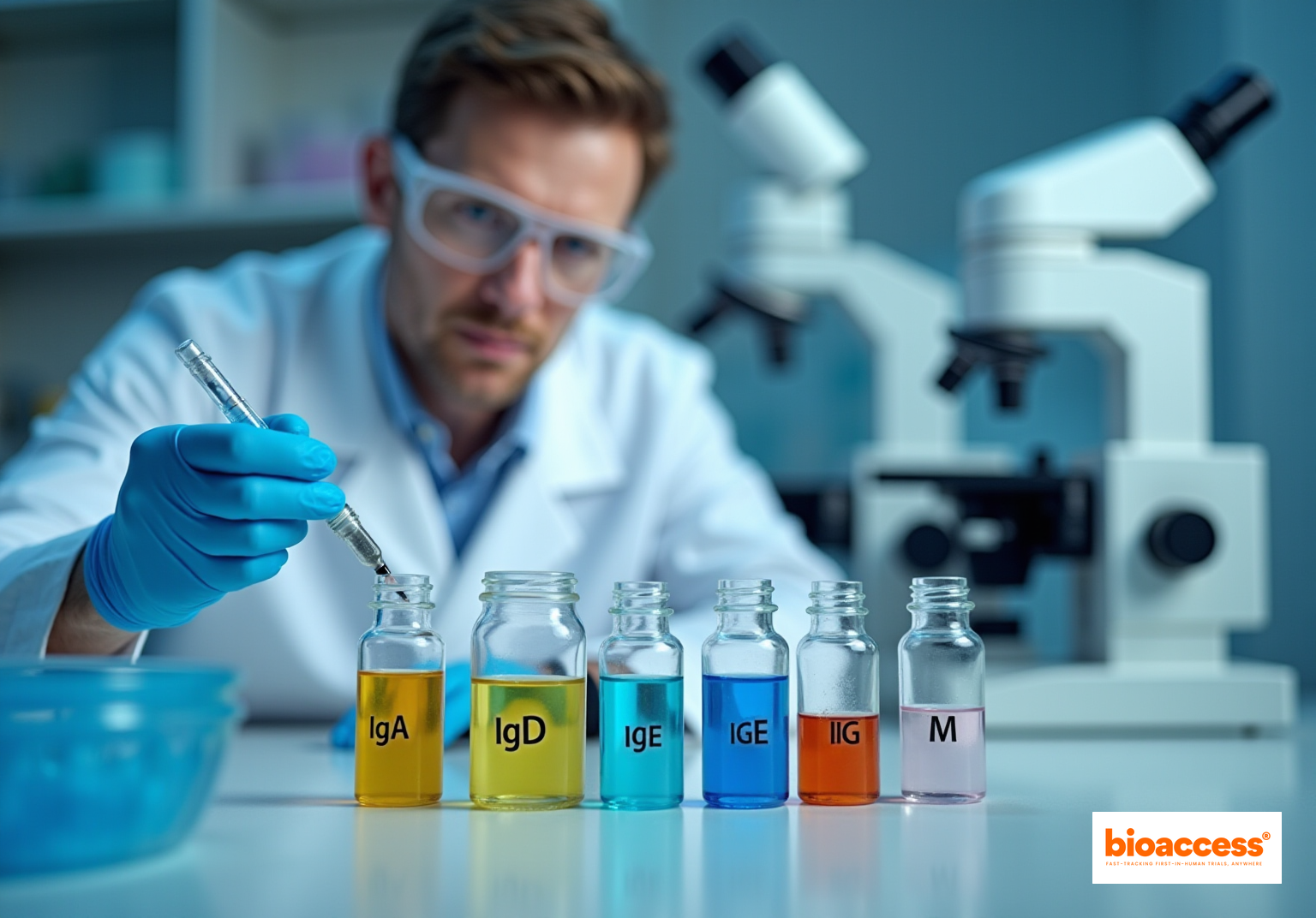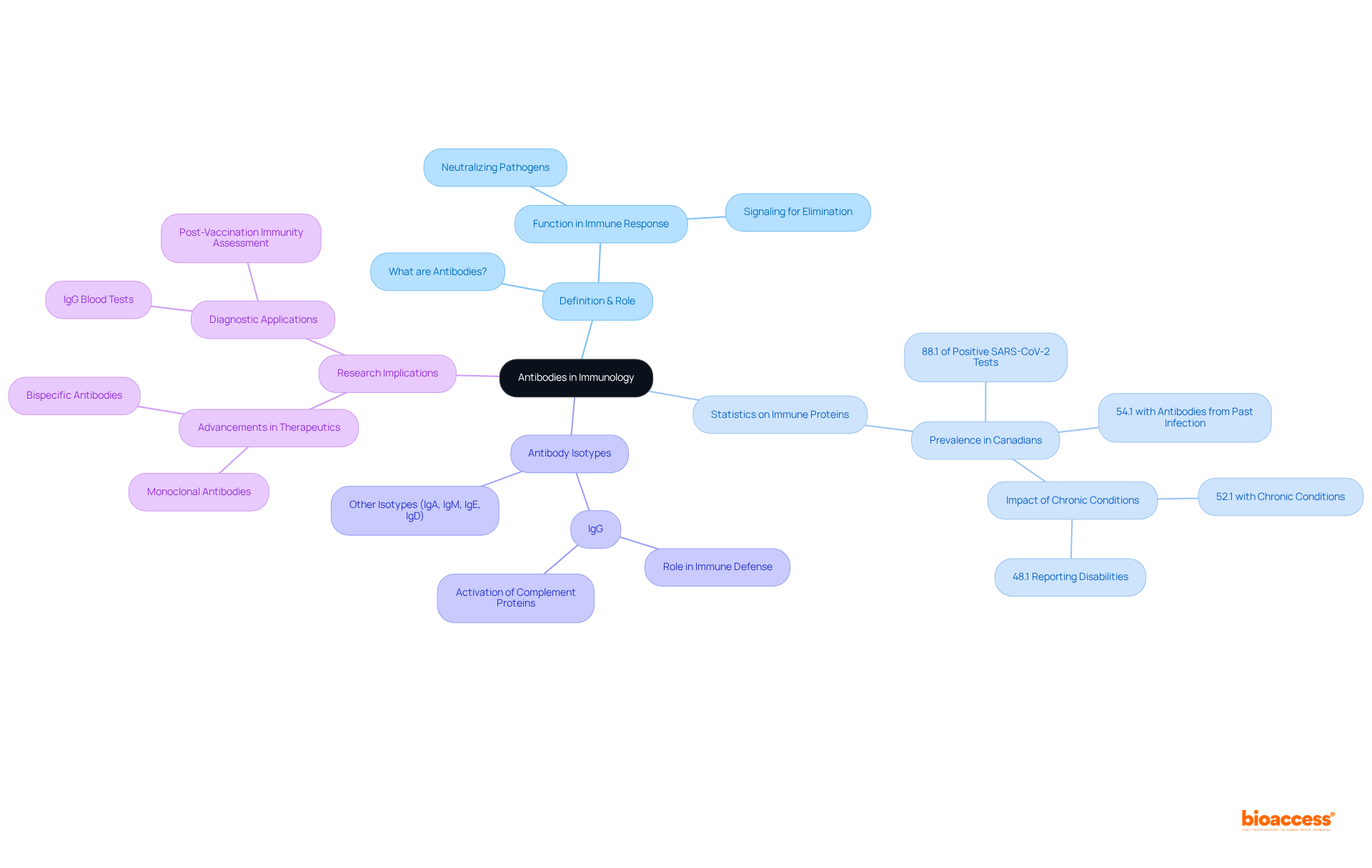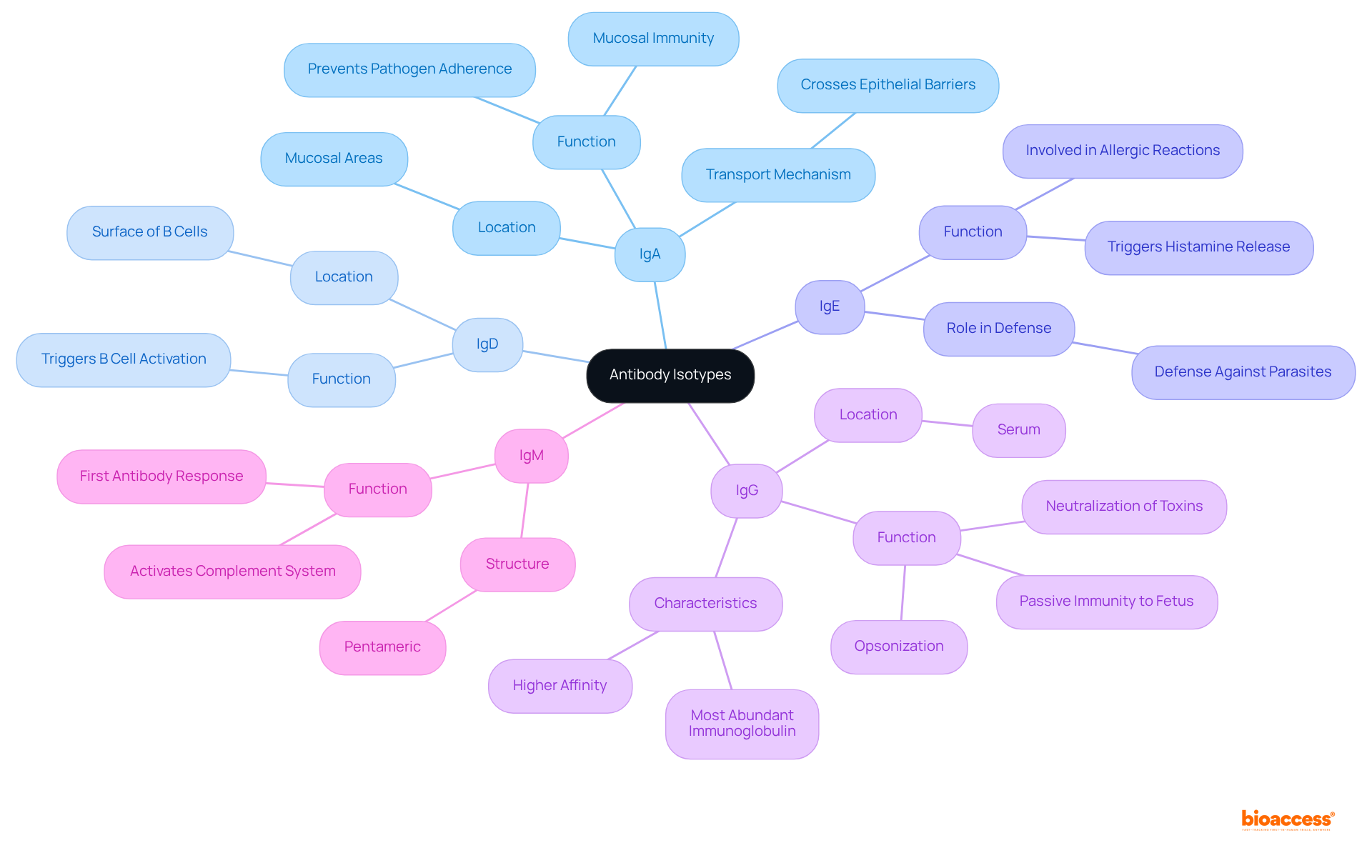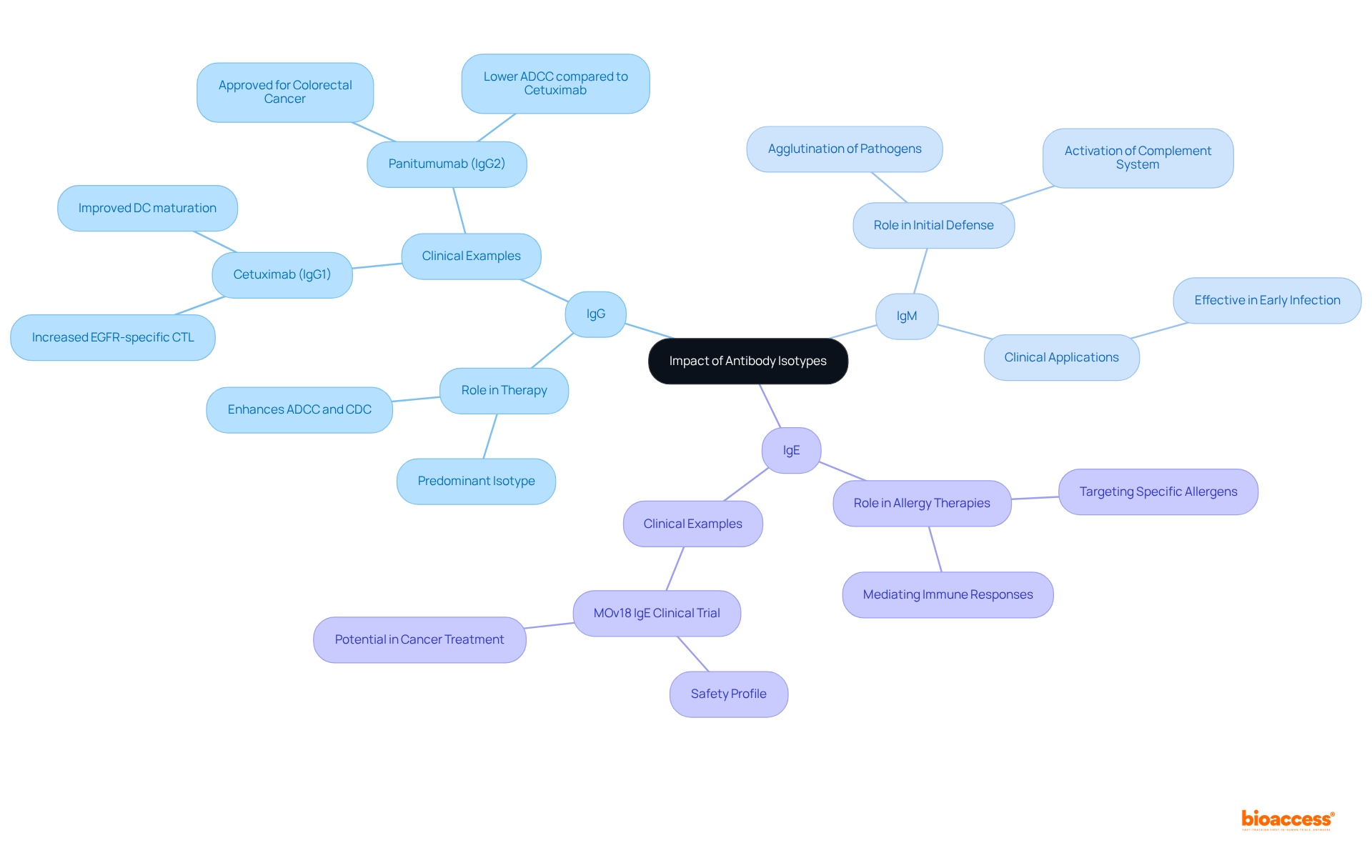


The article examines the functions of various antibody isotypes and their therapeutic implications, underlining their critical roles in immune responses and clinical applications. It asserts that the selection of antibody isotypes, particularly IgG, is essential for optimizing therapeutic efficacy across diverse diseases. This is evidenced by their capacity to engage with immune cells, ultimately enhancing patient outcomes in treatments such as monoclonal antibodies.
Antibodies stand as the unsung heroes of the immune system, meticulously designed to identify and neutralize a diverse array of pathogens. With five distinct isotypes—IgA, IgD, IgE, IgG, and IgM—each plays a pivotal role in orchestrating the body’s defense mechanisms. As the field of immunology advances, grasping the significance of these isotypes is essential, particularly in the context of therapeutic applications that could revolutionize treatment strategies for diseases ranging from allergies to cancer.
However, how do these variations in antibody structure and function translate into real-world therapeutic efficacy? What implications do they hold for future medical breakthroughs? These questions are critical as we delve deeper into the complexities of immunology and its potential to transform clinical research.
Antibodies, known as immunoglobulins, are specialized proteins produced by the body's defense system in response to foreign substances termed antigens. They are essential in identifying and neutralizing pathogens, including bacteria and viruses. By attaching to specific antigens, antibodies signal for their elimination by other defense cells, a process vital for the adaptive defense system, which tailors the body's protective mechanisms to specific threats.
Notably, recent research indicates that approximately 54.1% of Canadians possess immune proteins from prior infections, with 88.1% of those previously testing positive for SARS-CoV-2 exhibiting measurable immune proteins. This underscores the critical role of protein generation in the body's defense response.
There are five primary antibody isotypes—IgG, IgA, IgM, IgE, and IgD—each serving distinct functions and properties. Particularly, IgG immunoglobulins are recognized for their ability to activate complement proteins and enhance phagocytosis, making them indispensable in the body's defense against infections.
As immunologist Desmond Schofield states, "IgG proteins play a pivotal role in our immune system’s defense mechanisms." Understanding the diverse roles of these immune proteins, such as the antibody isotype, is crucial for advancing therapeutic approaches in immunology and biopharmaceuticals, particularly in developing treatments for various diseases, including autoimmune conditions and cancers.
Furthermore, IgG blood tests serve as versatile diagnostic tools, assisting in the assessment of post-vaccination immunity and the diagnosis of IgG deficiencies. As research progresses, the role of immune proteins in adaptive immunity remains a focal point for improving health outcomes.

Antibodies are classified into five main types known as antibody isotypes: IgA, IgD, IgE, IgG, and IgM, each exhibiting distinct characteristics and functions that are crucial to the immune response.
IgA is predominantly located in mucosal areas such as the gut and respiratory tract, serving an essential role in mucosal immunity. It prevents pathogen adherence and invasion, acting as a first line of defense against infections at epithelial surfaces. Notably, IgA antibodies are transported across epithelial barriers, underscoring their critical role in protecting mucosal surfaces.
IgD, mainly found on the surface of B cells, plays an essential role in triggering B cell activation and differentiation, thereby aiding the adaptive defense mechanism. Its presence on B cells is crucial for the development of effective immune reactions.
IgE is particularly known for its involvement in allergic reactions. It binds to allergens and triggers histamine release from mast cells, contributing to the inflammatory response and defense against parasitic infections. This isotype is significant in mediating hypersensitivity reactions.
IgG, the most prevalent immunoglobulin in serum, represents 70-85% of the total immunoglobulin pool. It is essential for opsonization, neutralization of toxins, and activation of the complement system. Furthermore, it is the only isotype capable of crossing the placenta, providing passive immunity to the fetus, which is crucial for early life protection. According to Janeway CA Jr., "IgG immunoglobulins are typically of higher affinity and are present in blood and in extracellular fluid, where they can neutralize toxins, viruses, and bacteria."
IgM is the first antibody generated in response to an infection, effective in forming complexes with antigens and activating the complement system, leading to pathogen lysis and removal from the body. Its pentameric structure allows for effective attachment to various antigens, thereby increasing its efficacy in the initial defense response.
The unique structures of these antibody isotypes, which are determined by their heavy chains, significantly influence their specific immune functions and interactions with other immune components. Current research continues to explore the roles of IgA, IgD, IgE, IgG, and IgM in immunity, highlighting their importance in both health and disease management. For instance, recent studies have demonstrated that high-affinity IgG and IgA proteins can neutralize bacterial toxins, preventing them from attaching to host cells and causing harm.

The selection of antibody isotype is pivotal in determining therapeutic efficacy across diverse clinical applications, particularly in monoclonal immunoglobulin therapies. Notably, IgG stands as the predominant isotype employed in therapeutic antibodies, chiefly due to its ability to interact with Fc receptors on immune cells, thereby augmenting antibody-dependent cellular cytotoxicity (ADCC) and complement-dependent cytotoxicity (CDC). For instance, the glycoengineered anti-CD20 antibody obinutuzumab (GA101) has showcased nearly double the progression-free survival in chronic lymphocytic leukemia patients in comparison to rituximab, highlighting the significance of IgG1 in cancer treatment. Moreover, cetuximab (IgG1) was administered at 400 mg/m followed by 250 mg/m weekly, markedly increasing EGFR-specific cytotoxic T lymphocyte frequencies post-treatment relative to panitumumab (IgG2).
IgM, characterized by its pentameric structure, excels in agglutinating pathogens and activating the complement system, rendering it particularly effective in initial defense mechanisms. Its ability to form large defense complexes bolsters its role in the early stages of pathogen elimination.
IgE is currently under investigation for its potential to target specific allergens and mediate immune responses in allergy therapies. Notably, only one participant experienced anaphylaxis during the MOv18 IgE clinical trial, underscoring the safety profile of these therapeutic agents.
Research consistently indicates that antibody isotype selection can profoundly influence the pharmacokinetics and pharmacodynamics of therapeutic agents, affecting their distribution, half-life, and overall efficacy. For instance, IgG1 isotypes are preferred in oncology due to their superior capacity to elicit immune responses against tumor cells, as evidenced by studies demonstrating that cetuximab significantly enhances dendritic cell maturation and tumor antigen processing.
Comprehending these dynamics is crucial for optimizing therapeutic strategies and enhancing patient outcomes, especially as the global market for monoclonal antibodies continues to grow, with 93 mAbs currently approved for clinical use. The ongoing investigation of antibody isotype-specific mechanisms is poised to yield more tailored and effective treatments in the future.

Antibody isotypes are integral to the immune response, each contributing distinctly to the body's defense mechanisms. A comprehensive understanding of these diverse isotypes—IgA, IgD, IgE, IgG, and IgM—reveals their specific functions, which are essential not only for immune protection but also for advancing therapeutic strategies in immunology and biopharmaceuticals.
This article explores the characteristics and roles of each antibody isotype, underscoring their significance in both health and disease management.
Moreover, the therapeutic implications of these isotypes are emphasized, particularly the dominant role of IgG in monoclonal antibody therapies, which significantly enhance treatment efficacy across various clinical applications.
Recognizing the importance of antibody isotypes highlights the necessity for ongoing research into their therapeutic potential. As the field of immunotherapy advances, a deeper understanding of the specific functions and interactions of these isotypes will be pivotal in developing targeted treatments that optimize patient outcomes. The insights garnered from this exploration not only propel scientific knowledge forward but also promise innovative therapeutic approaches capable of improving health across diverse populations.
What are antibodies and what role do they play in immunology?
Antibodies, also known as immunoglobulins, are specialized proteins produced by the body’s defense system in response to foreign substances called antigens. They are essential for identifying and neutralizing pathogens, such as bacteria and viruses, by attaching to specific antigens and signaling for their elimination by other defense cells.
How prevalent are immune proteins among Canadians?
Recent research indicates that approximately 54.1% of Canadians possess immune proteins from prior infections, with 88.1% of those who previously tested positive for SARS-CoV-2 exhibiting measurable immune proteins.
What are the main types of antibodies and their functions?
There are five primary antibody isotypes: IgG, IgA, IgM, IgE, and IgD. Each has distinct functions and properties. Notably, IgG immunoglobulins are recognized for their ability to activate complement proteins and enhance phagocytosis, making them crucial in the body’s defense against infections.
Why are IgG proteins important in the immune system?
IgG proteins play a pivotal role in the immune system’s defense mechanisms by activating complement proteins and enhancing the process of phagocytosis, which helps eliminate pathogens effectively.
How do IgG blood tests contribute to medical diagnostics?
IgG blood tests are versatile diagnostic tools that assist in assessing post-vaccination immunity and diagnosing IgG deficiencies, providing valuable information about an individual’s immune status.
What is the significance of understanding antibody isotypes in immunology?
Understanding the diverse roles of antibody isotypes is crucial for advancing therapeutic approaches in immunology and biopharmaceuticals, particularly in developing treatments for various diseases, including autoimmune conditions and cancers.